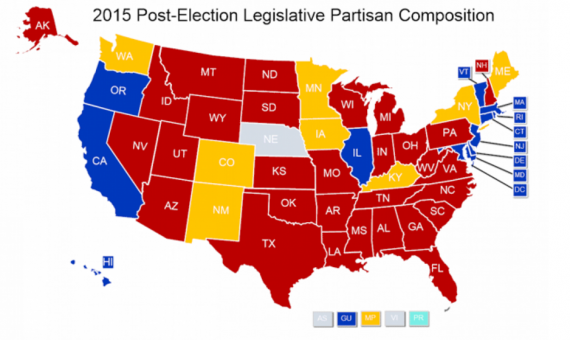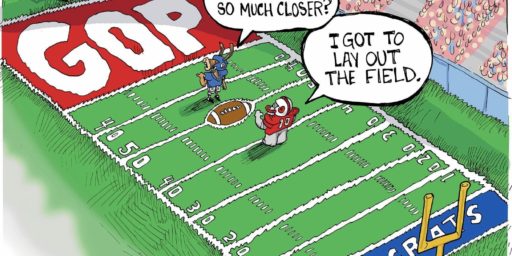Tuesday’s Elections Helped Solidify Republican Control Of America’s State Legislatures
Forget about Congress, the real story going forward is likely to be Republican dominance of state legislatures nationwide.
Chris Cillizza notes that Tuesday’s election results have helped add to the Republican Party’s extraordinary control over state legislatures across the United States:
The 2015 election is over. (You may not have known it was even happening.) And it proved one thing: Republicans have an absolute stranglehold on governorships and state legislatures all across the country.
Consider:
* With Matt Bevin’s win in Kentucky on Tuesday night, Republicans now hold 32 of the nation’s governorships — 64 percent of all the governors mansions in the country. (One race, in Louisiana, won’t be decided until next month. Democrats believe they have a good chance of winning that race against now-Sen. David Vitter.)
* Democrats’ failure to take over the Virginia state Senate means that Republicans still hold total control of 30 of the country’s 50 state legislatures (60 percent) and have total or split control of 38 of the 50 (76 percent.)
That dominance — and what it means to the policy and political calculations and prospects for both parties at the national level — is the single most overlooked and underappreciated story line of President Obama’s time in office. Since 2009, Republicans have made massive and unprecedented gains at the state level, gains that played a central role in, among other things, handing control of the U.S. House back to the GOP in the 2010 election.
The dominance that Cillizza speak of can be seen in the map that accompanies his post, which is at the top of this post. All of the states colored in red are, of course, states where the GOP controls both houses of the state legislature, while the states in blue are the ones where Democrats dominate. The states in yellow are those in which control of the legislature is split between the parties with one controlling each chamber. Nebraska, of course, is gray because its unicameral legislature is formally nonpartisan although the actual membership is dominated by members affiliated with the Republican Party. In four states where Democrats have control of both houses of the state legislature, consistent of Illinois, Maryland, Massachusetts, New Jersey, there is a Republican Governor, while the remaining states that have full Democratic control also have a Republican Governor. There are Democratic Governors, meanwhile, in six states (Missouri, Montana, New Hampshire, Pennsylvania, Virginia, and West Virginia) there is a Democratic Governor with a fully Republican legislature while the remaining states with fully Republican control have a Republican Governor, with the exception of Alaska. which has an Independent Governor. Among the eight split states, five states have Democratic Governors and split control of the legislature and the remaining three have a Republican control. Matt Bevin’s election in Kentucky will change the balance in this category to four for each party. Additionally, while Louisiana’s will remain in Republican control, that state’s Governor’s race won’t be decided until later this month in the runoff between Republican David Vitter and Democratic Candidate John Bel Edwards, so that states status could ch (Source)
The significance of this much Republican dominance at the state level cannot really be understated. It gives Republicans the ability to push through legislation that obviously otherwise would not get through Congress on a whole host of hot button issues ranging from abortion rights to election law changes such as Voter Identification laws and other provisions that have been the subject of litigation for several years now, and is likely to do so for years to come. Depending on how the states handle the judiciary, it potentially gives the party significant control over shaping the judiciary at the state level for years to come. When the 2020 Census is completed, this dominance, which seems likely to continue for the most part for several more years, could give Republicans significant control over redistricting just as it did in the wake of the 2010 elections, something that will have a significant impact on the composition of the House of Representatives starting in 2022 and beyond. Perhaps even more important than that, though, this kind of control gives the party a potentially deep bench from which to recruit candidates for Congress not only to challenge vulnerable Democrats but also to succeed Republicans who may end up retiring. In short, the fact that the Republican Party has such extensive control of state legislatures at this point is just as important as their control of both Houses of Congress, if not more important given the wide-ranging implications that control is likely to have going forward.
If nothing else, information like this emphasizes the fact that the focus that political pundits and the political media place on national politics to the often complete exclusion of state-level politics is often a case of seeing the forest, but missing the trees. Certainly, what happens at the national level both in Congress and with respect to the Presidency and the Federal Judiciary is profoundly important because of the extent that it impacts all of us regardless of where we live. It’s worth keeping in mind, though, that state-level politics is important as well even though it typically only gets national attention when something extraordinary happens. Keeping up with what’s going on at the state level is thus a bit hard than it is for national news, but there are some resources worth taking a look at if you’re interested in what’s going on in your state or others. The Washington Post’s The Fix blog has occasionally compiled a list of the best state-level political bloggers, although the current list appears to be about two years old. Nonetheless, while I can’t speak for the lists from other states, the list for Virginia is a fair representation of the best political bloggers in the state from both sides of the aisle. Earlier this early this year, they also compiled a list of the Twitter feeds of the top political reporters in all fifty states. (If anyone is aware of a more up-to-date list of state-level political bloggers, feel free to share it in the list.) It also points out the importance of voters at least making an effort to pay attention to the issues impacting elections at the state level as much as they do for Federal elections, if not more so. Given the way that state legislatures help set the national agenda and frames the term of national debate, and the fact that they often serve as a feeder or “minor league” system for Congress, this is probably something we should be paying more attention to.







There’s only about one more full cycle to fix this before redistricting comes up again.
Long ago (2004 ish?) I put on my big boy clothes (actual Canali suit, actual tie, shiny shoes) and went to Washington DC to try and promote my then brand-new political media company. I’d had the clever idea of designing template ads which you could turn around very quickly by plugging in candidate pix, etc…*
They were nice to me at the DSCC and the DCCC (D-Trip to the cool among us) and even the Dem governor’s group, whose acronym I forget. But we struck gold at the DLCC – the Democratic Legislative Campaign Committee, the party organ tasked with helping elect various car dealers, gym teachers, lawn maintenance technicians and random lunatics to state legislatures.
DLCC was not exactly Blofeld’s Secret Lair. There were no minions, no sign of exotic weaponry, and frankly the place looked like a not-terribly prosperous insurance agency. They made the D-Trip look like Apple. It was a half-assed organization doing an underfunded half-assed job – as evidenced by the fact that they immediately struck a deal with a guy whose major credit was, “I co-wrote Animorphs.”
Democrats need to get serious about this stuff. Money needs to be spent. Higher-class talent needs to be recruited. This is the unglamorous, down-and-dirty work that does not result in rapid rises through the part apparatus or consultancies.
* Won a Polly Award (bronze) for those ads. Then it dawned on me the work was boring and if I really meant to pursue it seriously it’d mean wearing suits all the time and going to DC parties and hanging out with. . . you know. . . consultants and party hacks and worse yet, candidates. So I quit.
I do blame Obama partly for this. Starting with when he picked two governors for his cabinet (Neapolitano of Arizona and Sebelius of Kansas) and both state went rapidly red. The party has gone down hill since Howard Dean ran it. One may disagree with Dean’s politics but he was a hard-nosed manager.
Democrats also got to realize that they have to govern better than Republicans. It’s not fair but it is true. Republicans get a pass.
You would think that by looking at this map that if the country is going down the tubes like the Republican say, then they should take the blame. But, again, they get a pass.
@michael reynolds: I quite agree. One issue on which the Democratic Party leadership needs to focus with great intensity is pushing Democratic-leaning groups to get out and vote in off-year and off-cycle elections. We just concluded a mayoral election in my hometown. The Republican candidate won handily. In the opinion of an emeritus political science professor at the university here, if the African-American turnout had matched the percentage that voted in the 1991 election (the last contested one), the Democratic candidate would have had a fighting chance.
@Scott:
Amen to that. Dean got the job done.
Charles Pierce compares state and local politicians as the farm teams for the big national show. I think he’s correct. Learn your skills and hone them and get assistance from the national GMs.
You’re doing a heckuva job, Bammy.
When liberals here talk airily about the coming demise of the Republican Party, they should read this three times, and that map should be tattooed to their foreheads.
I blame Obama too somewhat, since he de-emphasized the importance of party structure after he was elected. He honestly thought that we were moving to an era of post partisanship , where people of competence and good will were going to forget all about parties and red America and blue America and were going to reach across the aisle in a spirit of goodwill and kumbah yah. Boy, was he wrong.
The Democrats need to put a ton of money and resources into state and local parties. There is just no doubt now. It needs to be Priority One.Time to get rid of any DNC person who doesn’t see that.
The Tea Party is dead. Long live the Tea Party.
BTW, this surprised the hell out of the DC Republicans as well.
I wonder if anyone has looked below the state level? This is just an anecdote but one wonders if it is telling: